Future Russian-Iranian Import and Export Opportunities To Be Paid With National Currencies
28 Dec 2015

Currencies are a key element of international trade. Most deals tend to be tallied against the USD such that conversion from one currency to another will involve conversion into dollars before the currency denomination you want. When trading across borders, different currencies have different values relative to each other, so keeping down conversion costs is key.
This is the background to Moscow and Tehran recently raising currencies during their negotiations to expand economic and trade relations. Russian ministers and Iranian officials have been undertaking numerous visits to meet on each other’s territory. Iran’s Minister of Communication and IT, Mahmoud Vaezi, recently visited Moscow, along with with a delegation of 70 Iranian companies who want to expand import and export opportunities abroad.
Each side is keen to progress trade ties and tie up agreements as the deadline for the final lifting of sanctions draws closer. Vaezi’s Moscow meeting was part of the 12th meeting of the Iran-Russia joint economic commission. During these pivotal trade negotiations, he called for trade to be paid for using national currencies. Sara Rajabova reports for AzerNews, sourcing, Iran’s Fars news agency.
This forms part of both Russia and Iran’s longer term strategic financial goals of decoupling world trade from the dominant dollar, which is used for over 80% of global trade deals. Vaezi was keen to emphasise that closer direct banking cooperation prepares the ground for greater bilateral trade cooperation between Tehran-Moscow.
Earlier this year, Gholam Reza Panahi, the Deputy Governor for Currency Affairs at the Bank Melli of Iran, said that a mechanism that enables Iranian companies expanding their exports with Russian clients to transfer payments in rubles from Russian businesses to Iran has already been established. Iranian exporters can now expect to receive payments via the Moscow-based Mir Business Bank.
Iranian officials plan to establish joint rial accounts for Russian banks in Iran, which means Iranian exporters will be able to receive payments in rials for their exports to Russia. Direct ruble / rial financial trade mechanisms with Russia will speed up financial transactions between trade partners and cut down on transfer costs.
Other financial issues key for Iranian companies seeking greater import and export opportunities with Russia were also discussed during Vaezi’s visit to Moscow. For instance, Russia’s plans to open a $5 billion credit line for Iran. The idea of establishing a joint bank is under discussion, although this will take time to come to fruition. Iran’s membership in the Eurasian Development Bank will be key to smoothing transactions and trade deals with not only Russia, but other partners coming together to offer the alternative of trading without the world’s currently dominant currency, the USD.
Trade ties between Russia and Iran are gathering momentum, with Vazei’s visit following 50 Russian business delegates visiting Tehran recently. Both sides want to see a reversal of fortunes between the two countries. Between 2013-2015, Iranian-Russian trade plunged to $2 billion from double this turnover only two years previously.
Iran and Russia it seems are likely to invest $35-40 billion in joint medium-term projects, opening great opportunities for business seeking overseas expansion.
Oil To Smooth The Transition For Dollar Denominated Goods
During the Iran visit, Andrey Lugansky, a Russian trade representative, told Russian media that the two trade partners should also use currencies of third countries, to where Iran supplies its oil, to strengthen regional economic relations.
There are, of course, obstacles to moving away from dollar denominated trades in goods. Lugansky referred to “…the difficulties in the supply of grain from Russia to Iran.” Specifically, Russian prices are experiencing inflationary pressures recently. High prices, then, are a problem for Iran newly emerging from sanctions and also feeling the pressure of falling oil prices. "The second problem”, he said “…is that Iranian traders need rubles to purchase grain in Russia.".
Iranian banks hold numerous currencies of other trade partners, such as the Chinese yuan, South Korean won, Japanese yen and others. These countries are significant buyers of Iranian oil and petrochemicals. However, the supply of rubles is relatively short, making conversion from rials to purchase goods difficult.
Lugansky made reference to the existing oil-for-assets bartering between Iran and Russia; however, but low oil prices are preventing them from carrying out this arrangement. Russia itself recently suspended its own trade in oil until prices stabilised. Volatility of prices generally makes companies nervous of losing out by investing.
"Oil has fallen in price from the time the deal was signed, and this has become an objective obstacle to selling Iranian oil in any market. The program works, but so far with no results," Lugansky said.
The oil-for-goods exchange is worth $1.5 billion per month; under normalised circumstances, Russia would buy up to 500,000 barrels per day of Iranian oil in exchange for Russian equipment and goods.
Iran is working at controlling supply of oil onto the global market with OPEC partners. The US is now no longer so dependent on importing oil either. The shifts in supply are wreaking havoc with prices, which have plummeted from $100 in 2014 to around $35 per barrel at the time of writing. Global oversupply is a real challenge for Russia and Iran.
Nevertheless, according to details published about the bilateral barter arrangement, Iran will receive cash, Russian goods and services for Iranian oil sold. Meantime, the White Rose Group watches oil prices and continues to work with Iranian companies seeking to diversify trade in other commodities, goods and services.

our contact form.
The White Rose Group looks forward to hearing from you.



